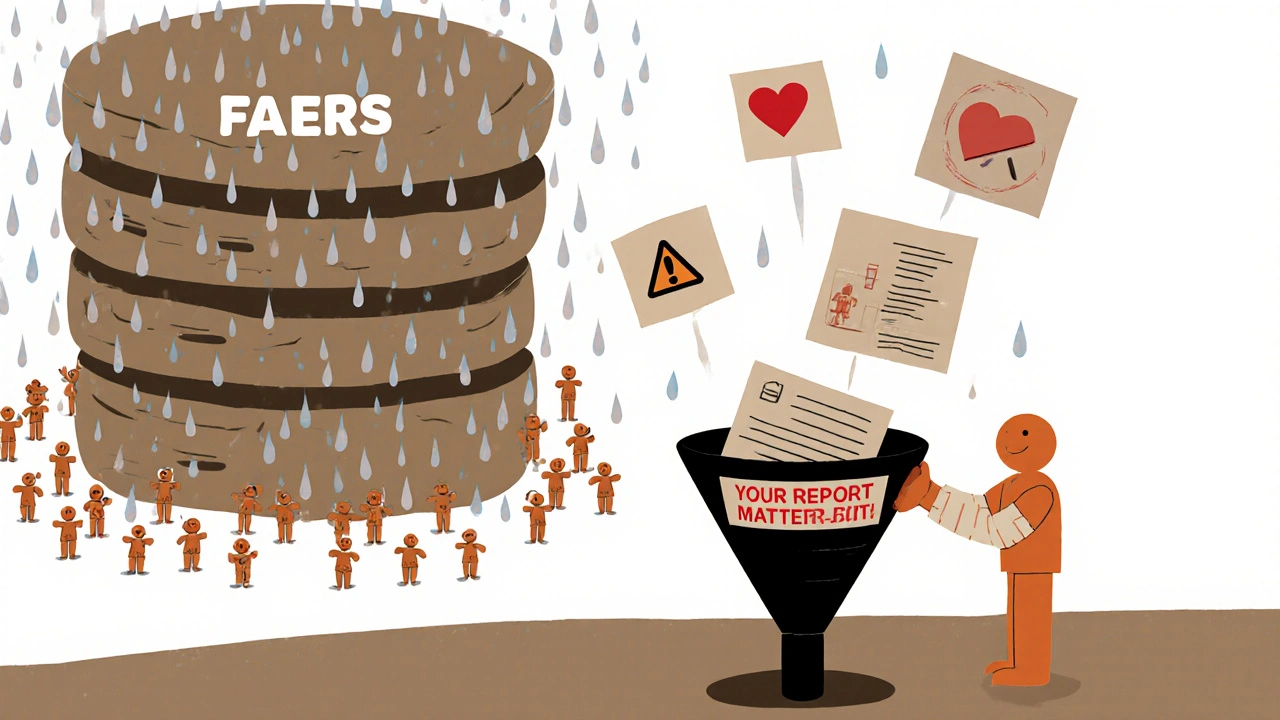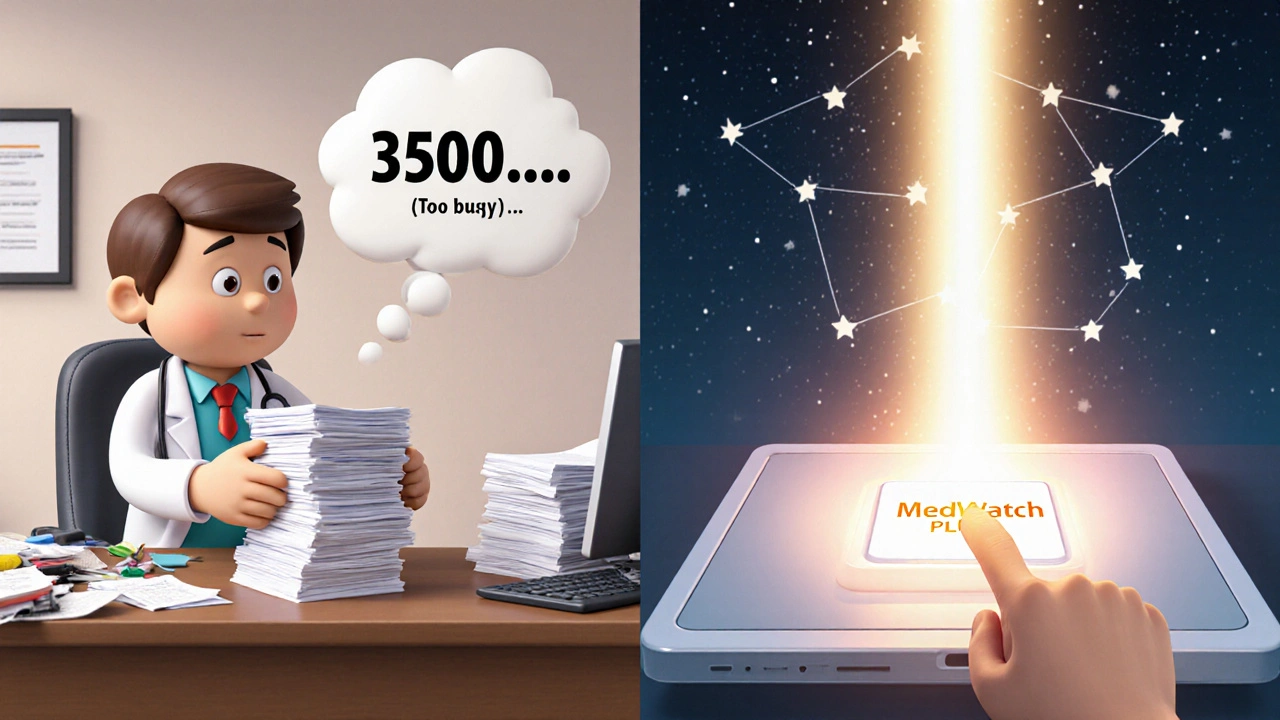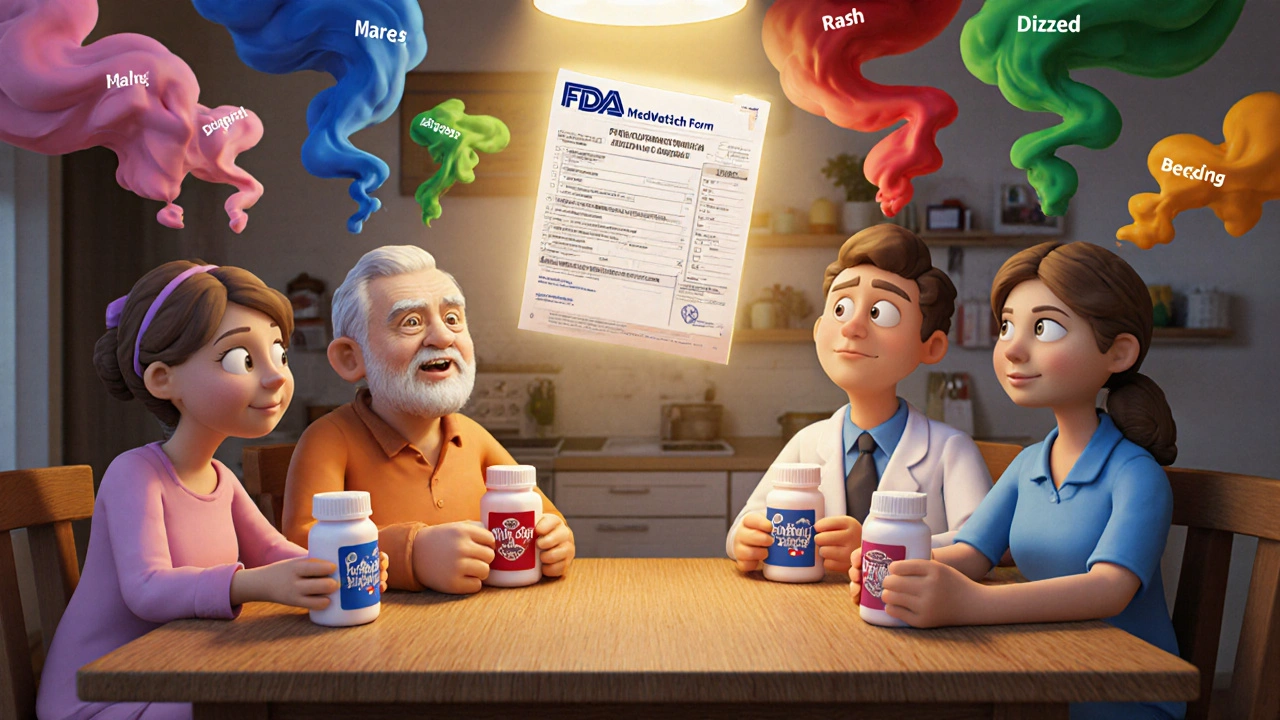Every year, over 1.3 million adverse drug reactions are reported to the FDA through MedWatch. But experts estimate that only about 6% of serious side effects ever make it into the system. That means for every 16 bad reactions, 15 go unreported. If you’ve had a strange reaction to a medication - whether it’s a new rash, dizziness that won’t quit, or something worse - your report could help save someone’s life. You don’t need to be sure it was the drug. You don’t need to be a doctor. You just need to speak up.
What Is MedWatch, Really?
MedWatch is the FDA’s official system for collecting reports about harmful side effects from medicines, medical devices, dietary supplements, and even some foods. It’s not a hotline. It’s not a complaint portal. It’s a safety net. The FDA uses these reports to spot patterns that clinical trials missed. A drug might seem safe in a trial of 5,000 people. But once millions start taking it, rare reactions show up. That’s when MedWatch kicks in.The system runs on two types of reports: mandatory and voluntary. Drug companies, hospitals, and pharmacies are legally required to report serious side effects. But you - the patient, the nurse, the pharmacist - can report too. And your report matters just as much.
MedWatch doesn’t prove causation. It doesn’t say, “This drug caused that reaction.” It says, “Someone had this reaction after taking this drug. Let’s look closer.” That’s how the FDA found the link between certain blood pressure meds and rare lung cancer, or how it flagged a diabetes drug that caused severe pancreatitis. Those discoveries started with a single report.
What Counts as a Reportable Reaction?
You don’t need to be a medical expert to know when something’s wrong. The FDA defines a “serious” adverse event as one that results in:- Death
- Hospitalization (or prolonging an existing hospital stay)
- Disability or permanent damage
- Life-threatening condition
- Birth defect
- Any event that requires medical intervention to prevent one of the above
Examples? A sudden heart rhythm change after starting a new antibiotic. Severe liver damage from an over-the-counter painkiller. An allergic reaction that landed you in the ER after taking a dietary supplement. Even if you’re not sure - report it anyway. The FDA says: “If you’re uncertain whether the product caused the event, report it anyway.”
Common reactions that people overlook? Persistent nausea that doesn’t go away. Mood swings or suicidal thoughts linked to antidepressants. Unexplained bruising after starting a new blood thinner. These aren’t “normal.” They’re red flags.
How to File a Report - Step by Step
There are three forms, but you only need to know two: one for healthcare providers, one for patients.If You’re a Patient or Family Member
Use FDA Form 3500B. It’s designed for people without medical training. It’s available in English and Spanish. You can fill it out online or print and mail it.- Go to www.fda.gov/medwatch
- Click “How to Report” then “Consumer/Patient”
- Download or fill out Form 3500B
- Fill in what you know: your name (optional), the drug name, when you started it, what happened, when it happened, and what you did about it
- Include any lab results or doctor’s notes if you have them
- Submit online, or mail it to the address on the form
It takes 15 to 20 minutes. You don’t need to guess why it happened. Just describe what happened. “I took ibuprofen for three days. On day four, I started vomiting blood.” That’s enough.
If You’re a Healthcare Professional
Use FDA Form 3500. You can file online through the MedWatch portal or use the paper form. You’ll need to include:- Patient age, sex, and medical history (if relevant)
- Drug name, dose, route, and duration
- Exact description of the reaction
- Time from first dose to reaction
- Outcome (did they recover? die? need surgery?)
- Any other drugs they were taking
Most doctors report in under 15 minutes. But here’s the problem: 68% of physicians say they rarely or never report. Why? They’re busy. They don’t know if it’s “serious enough.” They think someone else will report it. But if you don’t, no one might.

What Happens After You Submit?
Your report goes into the FDA Adverse Event Reporting System (FAERS). It’s a giant database that analysts mine for patterns. If 10 people report the same rare side effect from the same drug, that’s a signal. The FDA might:- Send a safety alert to doctors
- Update the drug’s warning label
- Require a new black box warning
- Ask the manufacturer to study the issue further
- In rare cases, pull the drug from the market
But here’s the hard truth: you probably won’t hear back. A 2022 survey found that 87% of healthcare providers never received any follow-up. That doesn’t mean your report didn’t matter. It means the system is silent by design. The FDA doesn’t respond to individual reports - it looks at the big picture.
Think of it like this: your report is one drop in an ocean. But without your drop, the ocean is missing a piece of the puzzle.
Why So Few People Report - And Why You Should Anyway
Most people don’t report because they don’t think it’ll make a difference. Or they’re afraid they’ll be blamed. Or they think the doctor already reported it. But here’s what the data says:- Only 1 in 10 serious reactions get reported
- Over half of all drug safety alerts started with a MedWatch report
- Between 2018 and 2023, MedWatch reports helped trigger 23 drug label changes and 4 product withdrawals
One nurse in Ohio reported a patient’s sudden loss of vision after taking a new cholesterol drug. Two months later, the FDA issued a warning. Three months after that, the drug manufacturer updated the label. The nurse never heard a word. But her report helped thousands.
Another example: a mother in Texas reported her 8-year-old’s severe skin reaction after using a new acne cream. The reaction was rare - only three other cases were ever reported. The FDA investigated. The cream was reformulated. The product stayed on shelves - but with a new warning.
That’s the power of reporting. You don’t need to be right. You just need to be honest.

What You Can’t Report - And What You Should Report Instead
MedWatch doesn’t handle vaccine side effects. Those go to VAERS (Vaccine Adverse Event Reporting System). It doesn’t handle medical device malfunctions unless they caused harm. For those, you still use MedWatch - but only if the device caused injury or death.What about dietary supplements? Yes. Since 2019, manufacturers must report serious side effects from supplements. But consumers can report too. If you got sick after taking a “natural” weight loss pill - report it. If your liver enzymes spiked after a “herbal energy booster” - report it. These aren’t regulated like drugs. That’s why your report matters even more.
Don’t wait for symptoms to get worse. Don’t wait to see your doctor. Report it as soon as you notice something off. The sooner it’s in the system, the faster the FDA can act.
What’s Changing in 2025?
The FDA is trying to fix the reporting gap. In 2023, they launched “MedWatch Plus,” a plan to integrate reporting directly into electronic health records. By 2025, doctors should be able to click a button in their patient chart to file a report - no extra forms needed.They’re also building AI tools to scan millions of reports faster. Right now, analysts manually review thousands. In 2027, they expect to handle 1.8 million reports a year. But if reporting rates don’t climb, even AI won’t help. The system only works if people use it.
There’s no app yet. No text alert. No automated way to report from your phone. But you can still do it in 15 minutes. Right now. From your kitchen table.
Final Thought: Your Report Could Be the One That Saves a Life
You might think, “It’s probably just a coincidence.” But what if it’s not? What if your experience is the first sign of a hidden danger? What if your report helps another parent avoid giving their child a dangerous supplement? What if it helps a doctor choose a safer drug for their next patient?The FDA doesn’t have magic powers. It doesn’t spy on pharmacies or track every pill. It depends on people like you to tell it what’s happening out there. Your report isn’t just paperwork. It’s a warning. It’s a voice. It’s the only thing standing between a silent danger and a public health crisis.
So next time you or someone you know has a strange reaction to a medication - don’t brush it off. Don’t assume someone else will report it. Take 15 minutes. Go to MedWatch. Submit the form. You might never know the impact. But someone else will live because you did.
Do I need to be a doctor to report an adverse drug reaction to MedWatch?
No. Anyone can report - patients, family members, caregivers, pharmacists, nurses, or even bystanders. The FDA provides a simplified form (3500B) designed for consumers with no medical training. You don’t need to understand medical terms. Just describe what happened, when, and with what drug.
What if I’m not sure the drug caused the reaction?
Report it anyway. The FDA explicitly says: “You do not need to be certain that the product caused the problem.” Many serious safety signals start with a single uncertain report. If you suspect a link - even if you think it’s unlikely - your report helps build the bigger picture.
Can I report side effects from over-the-counter drugs or supplements?
Yes. MedWatch accepts reports for prescription drugs, over-the-counter medications, dietary supplements, medical devices, and even certain foods or cosmetics if they caused a serious reaction. Supplements are especially important to report because they’re not tested as rigorously as prescription drugs before sale.
How long does it take to file a MedWatch report?
For patients using Form 3500B, it typically takes 15 to 20 minutes. For healthcare professionals using Form 3500, it can be done in under 15 minutes if you have the patient’s records handy. The online form guides you step by step, so there’s no need to guess what to include.
Will I get a response after I submit my report?
Most likely, no. The FDA does not respond to individual reports. Their job is to analyze patterns across thousands of reports. If your report contributes to a larger safety finding, you won’t be notified - but others may benefit. Over 85% of healthcare providers say they’ve never received feedback, but that doesn’t mean the report wasn’t valuable.
Is MedWatch the same as VAERS?
No. MedWatch is for drugs, medical devices, dietary supplements, and some foods. VAERS (Vaccine Adverse Event Reporting System) is only for vaccines. If you had a reaction to a flu shot, COVID vaccine, or tetanus shot, you must report it to VAERS, not MedWatch.
Can I report a reaction that happened years ago?
Yes. There’s no time limit. Even if the reaction happened months or years ago, you can still submit a report. While timely reports are more useful for immediate safety actions, historical reports help track long-term patterns and identify delayed side effects.


Gayle Jenkins
November 27, 2025 AT 06:30Kaleigh Scroger
November 28, 2025 AT 00:19Elizabeth Choi
November 28, 2025 AT 07:22Allison Turner
November 28, 2025 AT 14:53Darrel Smith
November 29, 2025 AT 16:49Aishwarya Sivaraj
December 1, 2025 AT 11:02Iives Perl
December 3, 2025 AT 00:19steve stofelano, jr.
December 3, 2025 AT 19:07Savakrit Singh
December 4, 2025 AT 13:51Cecily Bogsprocket
December 5, 2025 AT 06:30Jebari Lewis
December 6, 2025 AT 06:56Emma louise
December 6, 2025 AT 19:54sharicka holloway
December 7, 2025 AT 09:47